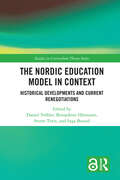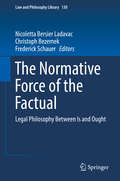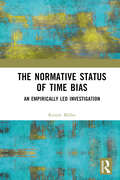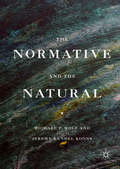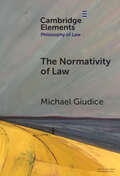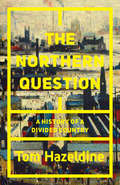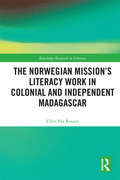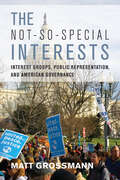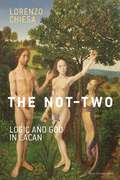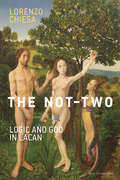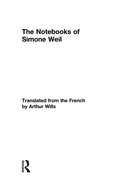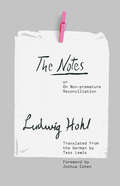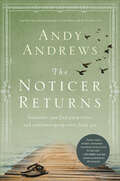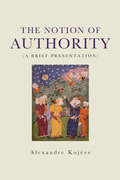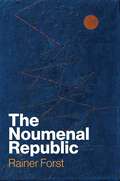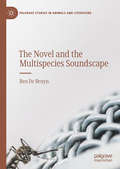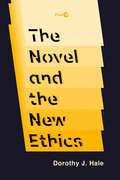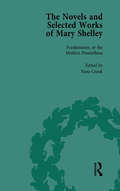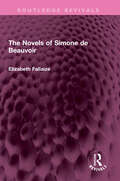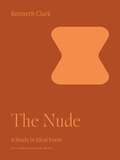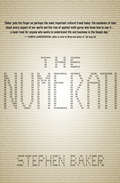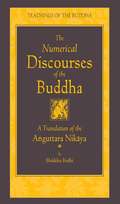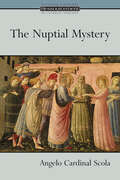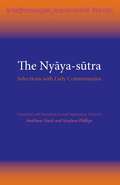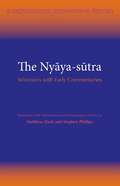- Table View
- List View
The Nordic Education Model in Context: Historical Developments and Current Renegotiations (Studies in Curriculum Theory Series)
by Daniel Tröhler Bernadette Hörmann Sverre Tveit Inga BostadTracing historical and cultural factors which gave rise to the Nordic Education Model, this volume explores why Northern European education policy has become an international benchmark for schooling. The text explains the historical connection between a Nordic ideal of democracy and schooling, and indicates how values of equality, welfare, justice, and individualism might be successfully integrated in national school systems and curricula around the world. The volume also highlights recent debates around the longevity of the Nordic model and explores the risks and challenges posed by international policy and assessment agendas. Exploring how Nordic education polices successfully merge social equity with academic excellence, the book combines cultural, historical, sociological and philosophical analysis with a deep exploration of curriculum and teaching. This book will be of great interest to researchers, scholars, and postgraduates working across the fields of curriculum, comparative education, cultural studies and history and philosophy of education and education policy.
The Normative Force of the Factual: Legal Philosophy Between Is and Ought (Law and Philosophy Library #130)
by Frederick Schauer Christoph Bezemek Nicoletta Bersier LadavacThis book explores the interrelation of facts and norms. How does law originate in the first place? What lies at the roots of this phenomenon? How is it preserved? And how does it come to an end? Questions like these led Georg Jellinek to speak of the “normative force of the factual” in the early 20th century, emphasizing the human tendency to infer rules from recurring events, and to perceive a certain practice not only as a fact but as a norm; a norm which not only allows us to distinguish regularity from irregularity, but at the same time, to treat deviances as transgressions. Today, Jellinek’s concept still provides astonishing insights on the dichotomy of “is” and “ought to be”, the emergence of the normative, the efficacy and the defeasibility of (legal) norms, and the distinct character of what legal theorists refer to as “normativity”. It leads us back to early legal history, it connects anthropology and legal theory, and it demonstrates the interdependence of law and the social sciences. In short: it invites us to fundamentally reassess the interrelation of facts and norms from various perspectives. The contributing authors to this volume have accepted that invitation.
The Normative Status of Time Bias: An Empirically Led Investigation
by Kristie MillerThis book empirically investigates the nature of time biases. Many philosophers think that it is rationally permissible to prefer a life that is overall worse to one that is overall better, as long as the badness of that life lies in the past rather than the future. These philosophers think that it is rationally permissible to be time biased. Time biased individuals differently value the wellbeing of their various selves in virtue of where those selves are located in time. This book focuses on three key kinds of time bias: near, present, and future bias. It presents a rich picture of the conditions under which we display these biases, and it outlines several psychological explanations for them. It then uses this new empirical research we conducted to inform arguments regarding the normative status of these biases. At its heart it considers the question: does having time biased preferences of one sort or another make us better off or worse off? And it uses the answers to these questions to inform our theorising about whether we have reason either to have or to avoid having such preferences.
The Normative and the Natural
by Michael P. Wolf Jeremy Randel KoonsDrawing on a rich pragmatist tradition, this book offers an account of the different kinds of ‘oughts’, or varieties of normativity, that we are subject to contends that there is no conflict between normativity and the world as science describes it. The authors argue that normative claims aim to evaluate, to urge us to do or not do something, and to tell us how a state of affairs ought to be. These claims articulate forms of action-guidance that are different in kind from descriptive claims, with a wholly distinct practical and expressive character. This account suggests that there are no normative facts, and so nothing that needs any troublesome shoehorning into a scientific account of the world. This work explains that nevertheless, normative claims are constrained by the world, and answerable to reason and argumentation, in a way that makes them truth-apt and objective.
The Normativity of Law (Elements in Philosophy of Law)
by Michael GiudiceIn the philosophy of law there has been a proliferation of advanced work in the last thirty years on the normativity of law. Recent theories explore law's character as a special kind of convention, shared cooperative activity, and social artifact, among other perspectives, to explain the precise way in which law provides subjects with reasons for action. Yet, for all their sophistication, such accounts fail to deliver on their promise, which is to establish how law creates more than just legal reasons for action. This Element aims to survey these views and others, situate them in a broader context of theories about the nature of law, and subsequently suggest a path forward based on the methodological continuity between analytical, evaluative, and empirical approaches to law's normativity.
The Northern Question: A Political History of the North-South Divide
by Tom HazeldineA history of the UK&’s regional inequalities, and why they matterBritain has scarcely begun to come to terms with its recent upheavals, from the crisis over Brexit to the collapse of Labour&’s &“red wall.&” What can explain such momentous shifts? In this essential work, Tom Hazeldine excavates the history of a divided country: North and South, industry versus finance, Whitehall and the left-behind. Only by fully registering these deep-seated tensions, he argues, can we make sense of the present moment. Hazeldine tracks the North-South divide over the longue durée, from the formation of an English state rooted in London and the south-east; the Industrial Revolution and the rise of provincial trade unions and the Labour party; the dashed hopes for regional economic renewal in the post-war years; the sharply contrasting fates of northern manufacturing and the City of London under Thatcher and New Labour; to the continuing repercussions of financial crisis and austerity. The Northern Question is set to transform our understanding of the politics of Westminster—its purpose, according to Hazeldine, to stand English history on its head.
The Norwegian Mission’s Literacy Work in Colonial and Independent Madagascar (Routledge Research in Literacy #11)
by Ellen Vea RosnesOffering an original historical perspective on literacy work in Africa, this book examines the role of the Norwegian Lutheran mission in Madagascar and sheds light on the motivations that drove colonizing powers’ literacy work. Focusing on both colonial and independent Madagascar, Rosnes examines how literacy practices were facilitated through mission schools and the impact on the reading and writing skills to Malagasy children and youth. Analysing how literacy work influenced identity formation and power relations in the Malagasy society, the author offers new insights into the field of language and education in Africa.
The Not-So-Special Interests: Interest Groups, Public Representation, and American Governance
by Matt Grossmann"Lobbyist" tends to be used as a dirty word in politics. Indeed, during the 2008 presidential primary campaign, Hillary Clinton was derided for even suggesting that some lobbyists represent "real Americans. " But although many popular commentators position interest groups as representatives of special-not "public"-interests, much organized advocacy is designed to advance public interests and ideas. Advocacy organizations-more than 1,600 of them-are now an important component of national political institutions. This book uses original data to explain why certain public groups, such as Jews, lawyers, and gun-owners, develop substantially more representation than others, and why certain organizations become the presumed spokespersons for these groups in government and media. In contrast to established theory and conventional wisdom, this book demonstrates that groups of all sizes and types generate advocates to speak on their behalf, though with varying levels of success. Matt Grossmann finds that the advantages of organized representation accrue to those public groups that are the most politically motivated and involved in their communities. Organizations that mobilize members and create a long-lasting presence in Washington become, in the minds of policymakers and reporters, the taken-for-granted surrogates for these public groups. In the face of perennial debates about the relative power of the people and the special interests, Grossmann offers an informed and nuanced view of the role of organizations in public representation and American governance.
The Not-Two: Logic and God in Lacan
by Lorenzo ChiesaIn The Not-Two, Lorenzo Chiesa examines the treatment of logic and God in Lacan's later work. Chiesa draws for the most part from Lacan's Seminars of the early 1970s, as they revolve around the axiom "There is no sexual relationship." Chiesa provides both a close reading of Lacan's effort to formalize sexual difference as incompleteness and an assessment of its broader implications for philosophical realism and materialism.Chiesa argues that "There is no sexual relationship" is for Lacan empirically and historically circumscribed by psychoanalysis, yet self-evident in our everyday lives. Lacan believed that we have sex because we love, and that love is a desire to be One in face of the absence of the sexual relationship. Love presupposes a real "not-two." The not-two condenses the idea that our love and sex lives are dictated by the impossibility of fusing man's contradictory being with the heteros of woman as a fundamentally uncountable Other. Sexual liaisons are sustained by a transcendental logic, the so-called phallic function that attempts to overcome this impossibility. Chiesa also focuses on Lacan's critical dialogue with modern science and formal logic, as well as his dismantling of sexuality as considered by mainstream biological discourse. Developing a new logic of sexuation based on incompleteness requires the relinquishing of any alleged logos of life and any teleological evolution.For Lacan, the truth of incompleteness as approached psychoanalytically through sexuality would allow us to go further in debunking traditional onto-theology and replace it with a "para-ontology" yet to be developed. Given the truth of incompleteness, Chiesa asks, can we think such a truth in itself without turning incompleteness into another truth about truth, that is, into yet another figure of God as absolute being?
The Not-Two: Logic and God in Lacan (Short Circuits)
by Lorenzo ChiesaA philosophical examination of the treatment of logic and God in Lacan's later psychoanalytic theory.In The Not-Two, Lorenzo Chiesa examines the treatment of logic and God in Lacan's later work. Chiesa draws for the most part from Lacan's Seminars of the early 1970s, as they revolve around the axiom “There is no sexual relationship.” Chiesa provides both a close reading of Lacan's effort to formalize sexual difference as incompleteness and an assessment of its broader implications for philosophical realism and materialism. Chiesa argues that “There is no sexual relationship” is for Lacan empirically and historically circumscribed by psychoanalysis, yet self-evident in our everyday lives. Lacan believed that we have sex because we love, and that love is a desire to be One in face of the absence of the sexual relationship. Love presupposes a real “not-two.” The not-two condenses the idea that our love and sex lives are dictated by the impossibility of fusing man's contradictory being with the heteros of woman as a fundamentally uncountable Other. Sexual liaisons are sustained by a transcendental logic, the so-called phallic function that attempts to overcome this impossibility. Chiesa also focuses on Lacan's critical dialogue with modern science and formal logic, as well as his dismantling of sexuality as considered by mainstream biological discourse. Developing a new logic of sexuation based on incompleteness requires the relinquishing of any alleged logos of life and any teleological evolution. For Lacan, the truth of incompleteness as approached psychoanalytically through sexuality would allow us to go further in debunking traditional onto-theology and replace it with a “para-ontology” yet to be developed. Given the truth of incompleteness, Chiesa asks, can we think such a truth in itself without turning incompleteness into another truth about truth, that is, into yet another figure of God as absolute being?
The Notebooks of Simone Weil
by Simone WeilSimone Weil (1909-1943) was a defining figure of the twentieth century; a philosopher, Christian, resistance fighter, anarchist, feminist, Labour activist and teacher. She was described by T. S. Eliot as 'a woman of genius, of a kind of genius akin to that of the saints', and by Albert Camus as 'the only great spirit of our time'. Originally published posthumously in two volumes, these newly reissued notebooks, are among the very few unedited personal writings of Weil's that still survive today. Containing her thoughts on art, love, science, God and the meaning of life, they give context and meaning to Weil's famous works, revealing an unique philosophy in development and offering a rare private glimpse of her singular personality.
The Notes: or On Non-premature Reconciliation (The Margellos World Republic of Letters)
by Ludwig HohlA collection of illuminating observations on life and art, from an acclaimed Swiss modernist Revered by Bertolt Brecht and Max Frisch as one of Switzerland&’s most commanding writers, Ludwig Hohl spent most of his waking hours with a pen in hand, collecting quotes from others and recording ruminations of his own. Composed between 1934 and 1936 during his residence in the Netherlands in a state of &“extreme spiritual desolation,&” The Notes is Hohl&’s magnum opus: an assemblage of his epiphany-like observations, disparate in subject yet threaded together by a relentless exploration of the nature and origins of creativity. Inspired by Spinoza, Goethe, and many others, The Notes contends with the purpose of work, the vitality of art, and the inevitability of death—a valiant, uncompromising exercise in hope against the devastating backdrop of twentieth-century Europe. This abridged edition, expertly translated by Tess Lewis and with an illuminating foreword by Joshua Cohen, introduces the reader to this remarkable work and its writer.
The Noticer Returns: Sometimes You Find Perspective, And Sometimes Perspective Finds You
by Andy AndrewsFrom New York Times bestselling author Andy Andrews comes the sequel to The Noticer! In the quiet coastal town of Fairhope, Alabama, a mysterious old man named Jones has set up shop to do the one thing he knows best—&“noticing&” the little things that make a big difference in people&’s lives. Perspective is a powerful thing.Through a chance encounter at a local bookstore, Andy Andrews is reunited with the man who changed everything for him— Jones, also known as &“The Noticer.&”Jones uses his unique talent of noticing the little things that make a big difference. And these little things grant the people of Fairhope, Alabama, a life-changing gift—perspective.Through the lens of a parenting class at the Grand Hotel in Point Clear, Jones guides a seemingly random group to ask specific questions inspired by his curious advice: &“You can&’t believe everything you think.&” The questions lead to answers for which people have been searching for centuries:How do we begin to change the culture in which we live?What is the key to creating a life of success and value?What if what we think is the end…is only the beginning?Along the way families are united and financial opportunities created, leaving the residents with powerfully simple solutions to the everyday problems we all face. What starts as a story of one person's everyday reality unfolds into the extraordinary principles available to anyone seeking to change their life.Jones&’ adventures continue in book three of The Noticer series: Just Jones.
The Notion of Authority: A Brief Presentation
by Hager Weslati Alexandre KojeveIn The Notion of Authority, written in the 1940s in Nazi-occupied France, Alexandre Kojève uncovers the conceptual premises of four primary models of authority, examining the practical application of their derivative variations from the Enlightenment to Vichy France. This foundational text, translated here into English for the first time, is the missing piece in any discussion of sovereignty and political authority, worthy of a place alongside the work of Weber, Arendt, Schmitt, Agamben or Dumézil. The Notion of Authority is a short and sophisticated introduction to Kojève's philosophy of right. It captures its author's intellectual interests at a time when he was retiring from the career of a professional philosopher and was about to become one of the pioneers of the Common Market and the idea of the European Union.From the Hardcover edition.ophy of right, while in the context of his biography its significance resides in the fact it captures his puzzling intellectual interests at a time when he retired from the profession of philosophy and was about to become one of the pioneers of the Common Market and the idea of the European Union.
The Noumenal Republic: Critical Constructivism After Kant
by Rainer ForstAll human beings are born with equal dignity and possess equal rights. This statement appears normatively just as irrefutable as it is empirically refuted every day. But what are the grounds of this principle, and how should we think about its realization? Its philosophical truth can best be explained by going back to (and beyond) Kant’s notion of a ‘noumenal republic’ in which every person is an equal co-author of the laws that bind all. At the same time, a critical analysis of society and politics must show the extent to which the reality of power and ideology makes a mockery of this constructivist conception of dignity. To bridge the gap between unworldly idealism and practical hopelessness, we need a critical theory after Kant. Rainer Forst, one of the world’s most influential political philosophers, works to develop just such a theory in this powerful and illuminating volume. It contains no less than a new systematic account of concepts such as alienation, progress and regression, solidarity, human rights, justice, power and non-domination.
The Novel and the Multispecies Soundscape (Palgrave Studies in Animals and Literature)
by Ben De BruynThe contemporary novel is not as silent as we tend to believe, nor does it only attend to human plots and characters. As this book shows, writers in a range of subgenres have devoted considerable attention to the voices of nonhuman animals, and to the histories and technologies of listening that shape twenty-first-century cultures and environments. In doing so, their multispecies novels illuminate the cultural meanings we attach to creatures like dogs, frogs, whales, chimpanzees, and Tasmanian tigers – not to mention various bird species and even plants. At the same time, these stories explore the attitudes of distinct communities of human listeners, ranging from vets and musicians to chimp caretakers and sonar technicians. In highlighting animal sounds and their cultural meanings, these novels by authors including Amitav Ghosh, Julia Leigh, Richard Powers, Karen Joy Fowler, Cormac McCarthy, and Han Kang also enrich pressing debates about species extinction, sound pollution, nonhuman communication, and human-animal relations. As we are violently reshaping the planet, they invite us to reimagine our own humanity and animality – and to rethink how we tell stories about multispecies contact zones and their complex soundscapes.
The Novel and the New Ethics (Post*45)
by Dorothy J. HaleFor a generation of contemporary Anglo-American novelists, the question "Why write?" has been answered with a renewed will to believe in the ethical value of literature. Dissatisfied with postmodernist parody and pastiche, a broad array of novelist-critics—including J.M. Coetzee, Toni Morrison, Zadie Smith, Gish Jen, Ian McEwan, and Jonathan Franzen—champion the novel as the literary genre most qualified to illuminate individual ethical action and decision-making within complex and diverse social worlds. Key to this contemporary vision of the novel's ethical power is the task of knowing and being responsible to people different from oneself, and so thoroughly have contemporary novelists devoted themselves to the ethics of otherness, that this ethics frequently sets the terms for plot, characterization, and theme. In The Novel and the New Ethics, literary critic Dorothy J. Hale investigates how the contemporary emphasis on literature's social relevance sparks a new ethical description of the novel's social value that is in fact rooted in the modernist notion of narrative form. This "new" ethics of the contemporary moment has its origin in the "new" idea of novelistic form that Henry James inaugurated and which was consolidated through the modernist narrative experiments and was developed over the course of the twentieth century. In Hale's reading, the art of the novel becomes defined with increasing explicitness as an aesthetics of alterity made visible as a formalist ethics. In fact, it is this commitment to otherness as a narrative act which has conferred on the genre an artistic intensity and richness that extends to the novel's every word.
The Novels and Selected Works of Mary Shelley Vol 1
by Pamela Clemit Nora Crook Betty T BennettThese eight volumes contain the works of Mary Shelley and include introductions and prefatory notes to each volume. Included in this edition are "Frankenstein" (1818), "Matilda" ((1819), "Valperga" (1823), "The Last Man" (1826), "Perkin Warbeck" (1830) and "Lodore" (1835).
The Novels of Simone de Beauvoir (Routledge Revivals)
by Elizabeth FallaizeFirst published in 1988, The Novels of Simone de Beauvoir concentrates specifically on the novels of the famous 20th Century French writer, Simone de Beauvoir. Her novels are popular with both the students and general readers of literature and philosophy, and they will welcome this authoritative introduction to Beauvoir’s fiction. The author examines Beauvoir’s choice of narrative strategies and interprets them both in relation to the sexual politics of writing and in relation to the place which the constraints of history, class and gender increasingly play in the texts. All quotations are translated.
The Nude: A Study in Ideal Form (The A. W. Mellon Lectures in the Fine Arts #2)
by Kenneth ClarkA landmark study of the nude in art—from the ancient Greeks to Henry Moore—by a towering figure in art historyIn this classic book, Kenneth Clark, one of the most eminent art historians of the twentieth century, examines the ever-changing fashion in what constitutes the ideal nude as a basis of humanist form, from the art of the ancient Greeks to that of Renoir, Matisse, and Henry Moore. The Nude reveals the sensitivity of aesthetic theory to fashion, what distinguishes the naked from the nude, and just why the nude has played such an important role in art history. As Clark writes, “The nude gains its enduring value from the fact that it reconciles several contrary states. It takes the most sensual and immediately interesting object, the human body, and puts it out of reach of time and desire; it takes the most purely rational concept of which man is capable, mathematical order, and makes it a delight to the senses; and it takes the vague fears of the unknown and sweetens them by showing that the gods are like men and may be worshipped for their life-giving beauty rather than their death-dealing powers.”Please note: All images in this ebook are presented in black and white and have been reduced in size.
The Numerati: How They'll Get My Number And Yours
by Stephen BakerLearn how the crisis over digital privacy and manipulation evolved in this &“utterly fascinating&” look at the growth of data mining and analysis (Seattle Post-Intelligencer). Award-winning journalist Stephen Baker traces the rise of the &“global math elite&”: computer scientists who invent ways to not only record our behavior, but also to predict and alter it. Nowadays, we don&’t need to be online to create a digital trail; we do it simply by driving through an automated tollbooth or shopping with a credit card. As massive amounts of information are collected, sifted, and analyzed, we all become targets of those who want to influence everything from what we buy to how we vote. Clear and &“highly readable,&” The Numerati is a look at the origins of our present-day world, the possibilities of the future, and those who—whether with good or bad intentions—profile us as workers, consumers, citizens, or potential terrorists (The Wall Street Journal).
The Numerical Discourses of the Buddha
by Bhikkhu BodhiLike the River Ganges flowing down from the Himalayas, the entire Buddhist tradition flows down to us from the teachings and deeds of the historical Buddha, who lived and taught in India during the fifth century B.C.E. To ensure that his legacy would survive the ravages of time, his direct disciples compiled records of the Buddha's teachings soon after his passing. In the Theravada Buddhist tradition, which prevails in Sri Lanka and Southeast Asia, these records are regarded as the definitive "word of the Buddha." Preserved in Pali, an ancient Indian language closely related to the language that the Buddha spoke, this full compilation of texts is known as the Pali Canon. At the heart of the Buddha's teaching were the suttas (Sanskrit sutras), his discourses and dialogues. If we want to find out what the Buddha himself actually said, these are the most ancient sources available to us. The suttas were compiled into collections called "Nikayas," of which there are four, each organized according to a different principle. The Digha Nikaya consists of longer discourses; the Majjhima Nikaya of middle-length discourses; the Samyutta Nikaya of thematically connected discourses; and the Anguttara Nikaya of numerically patterned discourses. The present volume, which continues Wisdom's famous Teachings of the Buddha series, contains a full translation of the Anguttara Nikaya. The Anguttara arranges the Buddha's discourses in accordance with a numerical scheme intended to promote retention and easy comprehension. In an age when writing was still in its infancy, this proved to be the most effective way to ensure that the disciples could grasp and replicate the structure of a teaching.
The Nuptial Mystery (Ressourcement: Retrieval and Renewal in Catholic Thought (RRRCT))
by Angelo ScolaTranslated by Michelle K. Borras The idea of love pervades our society, yet it is nearly impossible to answer the question What is love? especially as we witness the divorce of love from sexuality and of sexuality from procreation. Aware that many people today are skeptical about marriage, Angelo Cardinal Scola nevertheless suggests that only in the category of nuptial mystery do we find a way to adequately describe the phenomenon of love. A bright new leader in the Catholic Church, Cardinal Scola argues that the male-female relationship lies near the heart of what it means to bear the image of God. Scola's book explores the essential sexual differences that both separate and unite men and women, and it shows how men and women can realize their purpose in marriage or celibacy. Conversant with papal teaching and Catholic writers from Aquinas to von Balthasar, Cardinal Scola writes with a deep regard for marriage and the family. His Nuptial Mystery will leave readers with a thoroughly Christian appreciation for incarnate love.
The Nyaya-sutra: Selections with Early Commentaries
by Stephen Phillips Matthew DastiOften translated simply as "logic," the Sanskrit word nyāya means "rule of reasoning" or "method of reasoning." Texts from the school of classical Indian philosophy that bears this name are concerned with cognition, reasoning, and the norms that govern rational debate. This translation of selections from the early school of Nyāya focuses on its foundational text, the Nyāya-sūtra (c. 200 CE), with excerpts from the early commentaries. It will be welcomed by specialists and non-specialists alike seeking an accessible text that both represents some of the best of Indian philosophical thought and can be integrated into courses on Indian philosophy, religion, and intellectual culture.
The Nyaya-sutra: Selections with Early Commentaries
by Stephen H. Phillips Matthew R. DastiOften translated simply as "logic," the Sanskrit word nyāya means "rule of reasoning" or "method of reasoning." Texts from the school of classical Indian philosophy that bears this name are concerned with cognition, reasoning, and the norms that govern rational debate. This translation of selections from the early school of Nyāya focuses on its foundational text, the Nyāya-sūtra (c. 200 CE), with excerpts from the early commentaries. It will be welcomed by specialists and non-specialists alike seeking an accessible text that both represents some of the best of Indian philosophical thought and can be integrated into courses on Indian philosophy, religion, and intellectual culture.
